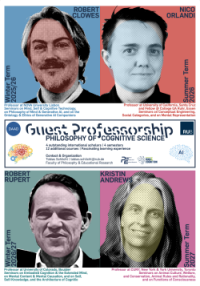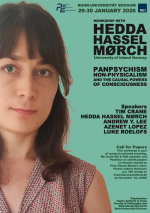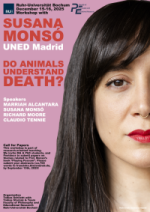Die Begrüßung der Erstsemesterstudierenden der Philosophie findet am Montag, 13. Oktober, 12 Uhr c.t., in HZO 30 statt.
Hier finden Sie das aktuelle Kommentierte Vorlesungsverzeichnis Wintersemester 25/26.
 Wir freuen uns über die großzügige Förderung eines internationalen Gastlehrstuhls für Philosophy of Cognitive Science in der Lehreinheit Philosophie durch den DAAD!
Wir freuen uns über die großzügige Förderung eines internationalen Gastlehrstuhls für Philosophy of Cognitive Science in der Lehreinheit Philosophie durch den DAAD!
Ab Wintersemester 2025/26 werden vier international renommierte Philosophinnen und Philosophen die Lehre in der Philosophie mit englischsprachigen Veranstaltungen bereichern. Im Winter 2025/26 bietet zunächst Prof. Robert Clowes (NOVA University Lissabon) Seminare zu Generativer KI, zu KI-Gefährten, und zur kognitiven Ontologie an. Im Sommer 2026 folgt Prof. Nico Orlandi (University of California Santa Cruz), im Winter 2026/27 Prof. Robert Rupert (University of Colorado, Boulder) und im Sommer 2027 Prof. Kristin Andrews (York University/CUNY New York).
Schließlich bieten Prof. Tobias Schlicht und Dr. Starzak jeweils ein englischsprachiges Seminar im Rahmen des Forschenden Lernens an, die sich an Bachelor-Studierende richten. Zu diesen Seminaren gehören jeweils Workshops mit den Autorinnen und weiteren ausgewiesenen internationalen Expert*innen.

 Herrn Dr. Starzaks Seminar "The Philosophy of Animal Minds" (Di 12-14 Uhr) legt das soeben auch auf Deutsch erschienene Buch der spanischen Philosophin Prof. Susana Monsó (UNED Madrid), Playing Possum (2024), sowie weitere ihrer Publikationen zugrunde. Der Workshop dazu findet am 15./16. Dezember 2025 im Veranstaltungszentrum statt.
Herrn Dr. Starzaks Seminar "The Philosophy of Animal Minds" (Di 12-14 Uhr) legt das soeben auch auf Deutsch erschienene Buch der spanischen Philosophin Prof. Susana Monsó (UNED Madrid), Playing Possum (2024), sowie weitere ihrer Publikationen zugrunde. Der Workshop dazu findet am 15./16. Dezember 2025 im Veranstaltungszentrum statt.
Herr Prof. Schlicht bietet ein Seminar zum Thema "Panpsychism" an (Do 10-12 Uhr). Hier liegt der Fokus auf dem Buch "Non-physicalist theories of consciousness" von Prof. Hedda Hassel Mørch (University Inland Norway) sowie weiteren ihrer Schriften. Der Workshop dazu findet am 29./30. Januar 2026 statt.
Es wird ein dreistufiges Anmeldeverfahren durchgeführt, d.h. es gibt unterschiedliche Anmeldefristen für die Einführungs- und Weiterführenden Module. Dazu sind in e-Campus folgende Fristen eingerichtet:
1. HSE 1 - Einführungsvorlesungen und Vorlesungen der WM-Module
(Standardverfahren):
Anmeldung: 30.07. – 06.12.2025
Abmeldung: 30.07. – 30.01.2026
2. HSE 1 - Begleitseminare (Zuteilungsverfahren):
Anmeldung: 10.08. – 16.10.2025, 11:30 Uhr
Abmeldung: 10.08. – 17.11.2025
3. Seminare der WM-Module (Losverfahren):
Anmeldung: 25.08. – 10.10.2025
Abmeldung: 25.08. – 31.10.2025
Nachrückfrist: ab 02.11.2025
Hinweise zum Zugriff auf e-Campus erhalten Sie unter https://www.it-services.ruhr-uni-bochum.de/services/ias/2fa.html.de.
Siehe auch
http://www2.uv.ruhr-uni-bochum.de/it-services/ecampus/studierende/campusoffice/index.html.de